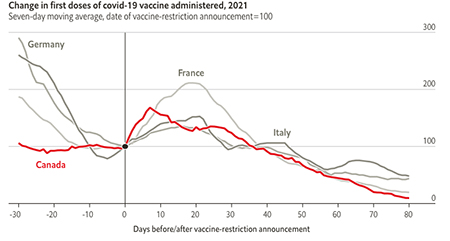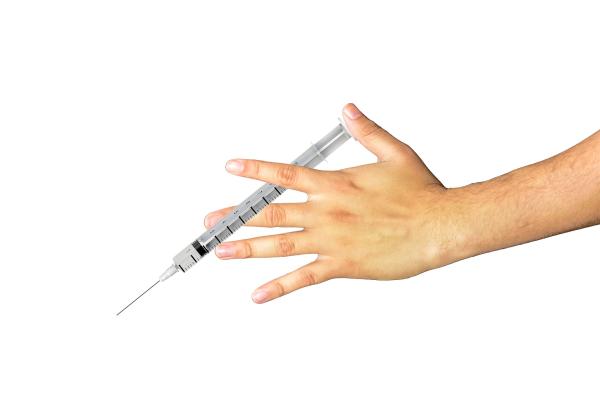The anti-mandaters claim not. In support of their position, articles are cited asserting that vaccines mandates shouldn’t work and are counter-productive. Not much (if any) reliable hard evidence exists in support of this premise. However, “soft” science pre-publication hypotheses do exist and have been offered to bolster anti-vaccine-mandate activists. When confronted, anti-mandaters respond that data proving vaccine mandates do work does not exist either.
But data does [sic] exist showing that mandates work
This is not to say that mandates are uniformly embraced. Or to assume there won’t be grave objections. But that, however, is a different question. For now, we’re just evaluating if evidence exists to support the premise that mandates can -- and do work.
Citizens of other countries remain decidedly unmoved by the theoretical prognostications of vaccine mandate blowback and ineffectiveness. Last Sunday, Austria enacted a COVID vaccine mandate - replete with a $4100 fine for non-compliance. To be sure, tens of thousands demonstrated against the new law, but only the extreme right party opposed it when it came up for a vote.
“I would have preferred to go another way. But…we need to take this drastic step.” Alexander Schallenberg, former chancellor of Austria.
Actually, Austria’s vaccine compliance isn’t all that bad. It’s even better than America’s: 69% of Austrians have certificates attesting to complete coronavirus vaccination— including a booster for those vaccinated over six months ago.
Canadians, too, have come out in support of penalizing the unvaccinated. In a recent poll, 27% of Canadians agreed that the unvaxxed should be jailed for up to five days “for endangering others/overwhelming (the) healthcare system.”
"We have … demonstrated at the federal level that vaccine mandates work, … almost 99% of public servants at the federal level are either fully vaccinated or soon to be…." Jean-Yves Duclos, Canadian Health Minister.
 Early Canadian data supports the efficacy of vaccine mandates. Canada’s foray into the effort took the form of a health tax, and vaccine appointments spiked upon its enactment. In August 2021, Quebec became the first Canadian province to require vaccination before accessing public facilities. In the week following the enactment, first-dose vaccines increased 42%; over two weeks, it increased 71%. In total, an estimated 287,000 more people were vaccinated over six weeks. (Yes, swaths of citizens were unhappy and demonstrated against it.)
Early Canadian data supports the efficacy of vaccine mandates. Canada’s foray into the effort took the form of a health tax, and vaccine appointments spiked upon its enactment. In August 2021, Quebec became the first Canadian province to require vaccination before accessing public facilities. In the week following the enactment, first-dose vaccines increased 42%; over two weeks, it increased 71%. In total, an estimated 287,000 more people were vaccinated over six weeks. (Yes, swaths of citizens were unhappy and demonstrated against it.)
During the summer, Italy introduced similar nationwide vaccine mandates. By the end of October 2021, more than 85% of Italy’s eligible population had been vaccinated, an estimated 12% increase over the expected level without the mandate. Similar statistics were reported for France and Germany. A pre-print by four Simon Fraser University economists projected that the mandates prevented 46,000 hospitalizations, 6,000 deaths, and more than $11 billion in economic losses!.
Italy and Greece have now mandated vaccines for all residents over 50 and 60, respectively.
Looking Backwards to Get Clues for the Future
Vaccine mandates are not new -- and vaccine-related mandates have clearly prevented disease and ended epidemics in the past.
In the US, we’ve required children to be vaccinated for communicable childhood diseases (diphtheria, measles, mumps, pertussis, poliomyelitis, rubella, and tetanus) since 1977. And it’s made a difference. Where once we saw hundreds of children die from these diseases yearly, now we typically see one or none.
In most places in the US, the high vaccination rate protects even those who refuse vaccination – that is until too many choose not to vaccinate, finding legal loopholes wherever they can. Then, there is trouble. (See ahead). Exemptions allow parents to opt-out for bona fide reasons – although six states have removed all non-medical excuses. And compliance isn’t perfect. In the wake of the Andrew Wakefield phony autism scare, Measles-Mumps-Rubella (MMR) vaccine compliance plummeted - and concurrently, measles cases skyrocketed.
Lessons from Abroad
The differences between countries’ vaccine policies are striking. Israel has no mandatory pre-school vaccination requirement. (Of course, the Israeli National Health System, with its emphasis on preventive medicine, is obsessive about fostering vaccination, relentlessly reminding/cajoling/badgering its “clients” to vaccinate). Nevertheless, 2018 reflected the formal arrival of the anti-vax movement in Israel. Not surprisingly, Israel reported 4,300 cases of measles and three deaths in the 2018-2019 measles pandemic, ranking 6th in the world – the only economically advanced country to be included in WHO’s top ten list.
Ignoring history and riding on the coattails of COVID-anti-ism, Kansas is about to all but eviscerate the stringencies on religious exemptions by allowing parents to claim a religious exemption - on merely a say-so. Next, their legislators plan on removing all requirements altogether. Here’s how that might play out:
In 2018-2019 we saw the highest incidence of vaccine non-compliance – and a global measles pandemic. Samoa was especially hit hard, with a hospitalization rate of 40% and a case fatality rate 1.5% -- higher than the current American COVID-19 case fatality. The Samoan epidemic was only quelled after a mandatory vaccination law required all 200,874 Samoans to be vaccinated.
The New York Measles Outbreak Provides More Answers
1246 cases of measles were reported in the US 2018-2019 epidemic - the highest number in 30 years.
“New York … became the center of a nationwide measles outbreak that has sickened more than 1,000 Americans in 28 states so far this year. Many of the cases in New York have been in Orthodox Jewish communities where vaccination rates are low.” – Pew Research Center
Some 86% of the American measles epidemic of 2018-2019 were traceable to infiltration by unvaccinated Israeli visitors to two ultra-Orthodox Jewish areas of New York, Rockland and Kings County in NYC, an hour apart by car. They were infected within a day of each other, accounting for 75% of all American cases.
The New York City epidemic seeded 39 cases in Michigan and 40 cases in New Jersey and upstate NY–locales with poor vaccination rates (and targets of the anti-vax efforts of Del Bigtree [2] and to a lesser extent RFK Jr.)
NYC’s Mayor DeBlasio virtually ignored the situation for six months until two neighborhoods in Brooklyn (Kings County) with similar populations as the hard-hit areas in Rockland registered 285 cases. Then he took action, implementing a vaccine mandate, replete with a $1,000 fine, for anyone appearing in public without a vaccine. The anti-vaxxers immediately challenged the order.
Rockland treated the matter more aggressively from the outset. Nevertheless, six months after the initial outbreak, Rockland found itself with 166 cases. Fifty-six patients, mostly children, were hospitalized for an 18% hospitalization rate; “[f]ifteen . . . were so sick that they ended up in . . . intensive care.” On March 26, Rockland County’s Chief Executive issued an emergency order barring unvaccinated children from public spaces (including schools). The onus was on parents who faced fines and jail time for disobedience. The anti-vaxxers challenged this order as well.
The courts addressed both orders in early April. The Rockland County judge struck down the order; the Brooklyn judge upheld it. Subsequent vaccination rates and cases reflected the judicial holdings.
Between October 2018 and March 2019 (before the order was struck down), Rockland County tallied 16,958 MMR vaccinations, an average of 2880/month. By March and April, the County registered thirty-one cases of measles, down by 50% from January and February. By comparison, NYC (with its desultory vaccine efforts) reported 362 cases for those two months¾up more than three times compared to the prior two months.
After Rockland’s emergency order was struck down, the vaccination average dropped to 2,190/month over the next nine weeks; in other words, the vaccination rates decreased by 75%. Not surprisingly, perhaps, Rockland County reported eighty-four new measles cases for May, a six and a half-fold increase from the thirteen cases registered in April.
The situation was far different in New York City. The Health Department tried to increase vaccination rates before the emergency order and vaccination did increase initially when the epidemic was first publicized. But mass persuasion efforts by the City and private entities such as the Orthodox Jewish Nurses Association were countered by anti-vax groups, and vaccine ennui and resistance set in. The impact of the early vaccination initiative quickly petered out, and cases continued to rise dramatically – until de Blasio’s order was implemented.
Shortly after a Brooklyn Judge upheld the emergency order, vaccination rates surged - and cases dwindled. By late May, New York City had issued 123 civil summonses for non-compliance with its mandate. Vaccination rates remained high until the epidemic was quelled some three months later.
The impact of the mandate order (and its legal sanctions) was dramatic. Immediately upon its enactment– per data compiled by the NYC Health Department and published in the New England Journal of Medicine -- vaccinations rose, and cases dramatically fell.
The data demonstrate that vaccine mandate intervention was directly related to increased vaccine uptake – and consequent dramatic decrease in cases, eventually eradicating the epidemic entirely by July. In early September 2019, the outbreak was declared over (two incubation periods of 42 days after the last reported case). This was just in time to enable America to retain its official WHO measles-free status.
We may not like to use them, but there is no denying that vaccine mandates, while not the medium of first choice, do work – and effectively so.
[1] Legal Decision-making and Crisis Standards of Care Tiebreaking During the COVID-19 Pandemic and in Other Public Health Emergencies JAMA DOI: 10.1001/jamahealthforum.2021.4799
[2] Mr. Bigtree is a television and film producer and heads the anti-vaccination Informed Consent Action Network






